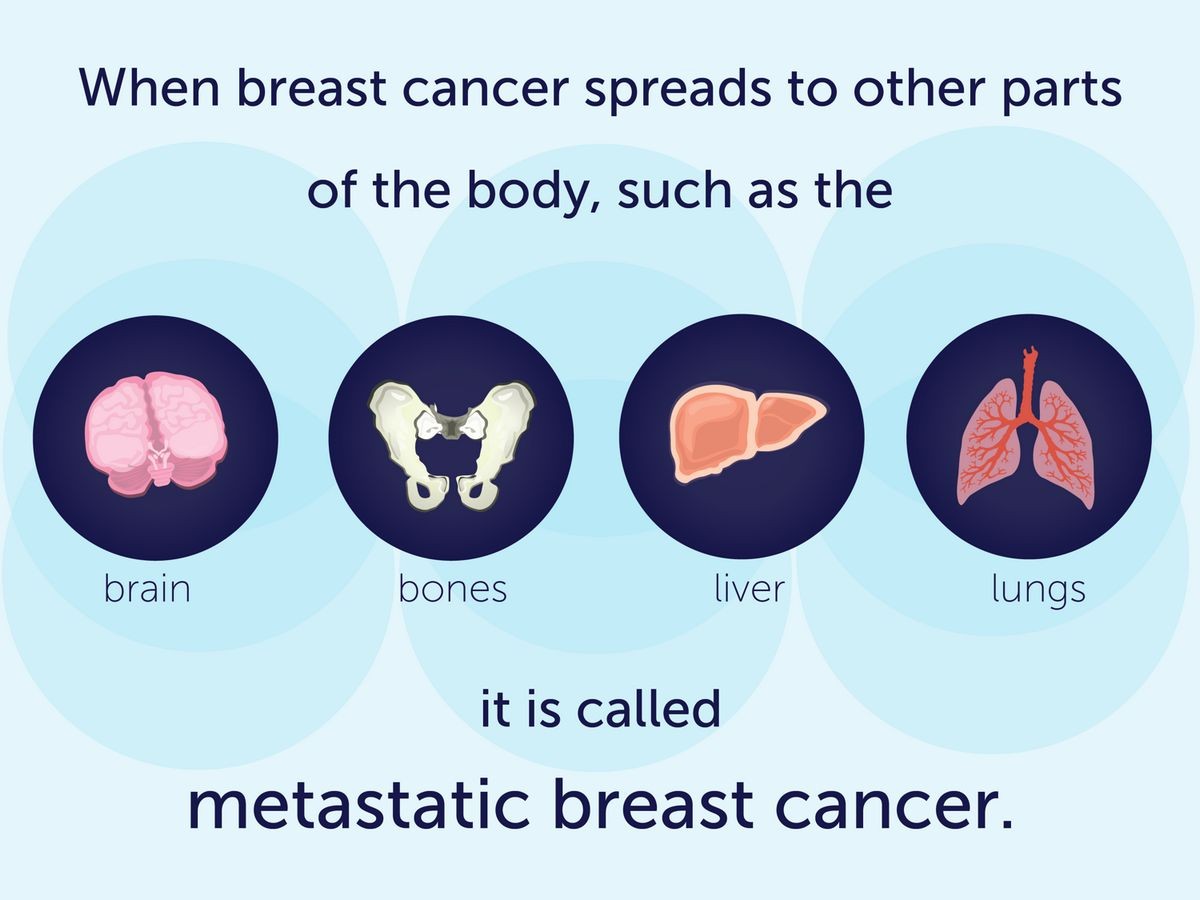
Contents
- 1 Signs of Metastatic Breast Cancer
- 1.0.1 Signs of Metastatic Breast Cancer
- 1.0.2 Bones
- 1.0.3 Lungs
- 1.0.4 Liver
- 1.0.5 Brain
- 1.0.6 Skin
- 1.0.7 Most Likely Metastasize Breast Cancer Types
- 1.0.8 Treatment of Metastatic Breast Cancer
- 1.0.9 Treatment Options for Metastatic Breast Cancer
- 1.0.10 Hormone Therapy
- 1.0.11 Targeted Therapy
- 1.0.12 Immunotherapy
- 1.0.13 Survival Rate for Metastatic Breast Cancer
Signs of Metastatic Breast Cancer
Metastatic breast cancer is stage IV cancer that spreads to other parts of the body. Cancers are diseases in which cells turn abnormal and proliferate uncontrollably. Cancer can start anywhere and spread, but it is named after the organ in which it first develops. Men can also develop breast cancer, although it is rare.
If breast cancer spreads to the bone, it is still considered metastatic breast cancer, not bone cancer. In metastatic breast cancer, cells break from the primary tumor, travel through blood or lymph fluid, settle into other parts of the body, and grow into new metastatic breast tumors.
Signs of Metastatic Breast Cancer
General signs that breast cancer has spread and become metastatic include:
- Constant fatigue
- Constant nausea
- Loss of appetite
- Unexplained weight loss
Other symptoms of metastatic breast cancer depend on the specific affected organ:
Bones
- Pain in bones, especially when lying down
- Bone fractures from minor trauma
- High calcium levels in blood (hypercalcemia)
Lungs
- Breathing difficulties
- Persistent cough
- Coughing up mucus or blood
- Pain and tightness in chest
Liver
- Nausea and vomiting
- Persistent hiccups
- Build-up of fluid in abdomen (ascites)
- Swelling of feet and hands
- Yellowing of skin (jaundice) and itching
- Pain in abdomen
- Anemia and fatigue
Brain
- Headache and dizziness
- Blurred or double vision
- Speech problems
- Nausea and vomiting
- Weakness or numbness on one side of body
- Loss of balance and coordination
- Confusion and memory problems
- Changes in mood and behavior
- Seizures
Skin
- Dimpling and thickening of breast skin (orange peel look)
- Redness and warmth of breast skin
- Swelling of breast skin
- Tender, painful, and/or itchy skin
- Swollen lymph nodes around collarbone and/or under arms
Most Likely Metastasize Breast Cancer Types
Breast cancers are classified by the types of cells in which they develop. The primary types of cancers that metastasize are invasive cancers that grow large quickly and spread into nearby breast tissue. The two main types of invasive cancers are:
- Invasive ductal carcinoma (IDC): IDC starts in ducts and accounts for 80% of invasive breast cancers.
- Invasive lobular carcinoma (ILC): ILC starts in milk glands (lobules) and accounts for 10% of invasive breast cancers.
Breast cancers are also graded from one to three based on how abnormal the cancer cells look and how fast they grow. Grade one is a low-grade cancer that grows slowly and is unlikely to spread, and grade three is a high-grade cancer that grows fast and is more likely to metastasize.
Types of breast cancers most likely to metastasize include:
- HER2-positive breast cancer: HER2 breast cancers are aggressive cancers with an abnormal amount of HER2 proteins on the cell surface. Excess HER2 protein in cancer cells speeds up their growth.
- Triple negative breast cancer: Triple negative cancers have no HER2 proteins and lack hormone receptors. HR cancers respond to hormone therapy and grow slower, but triple negative cancers do not respond to HR-/HER2-positive treatments and grow rapidly.
- Inflammatory breast cancer: Inflammatory breast cancer produces swelling and redness and is caused by cancer cells blocking the lymphatic ducts. Inflammatory breast cancers are usually diagnosed in the third stage when they have already metastasized to the skin.
Some other rare types of aggressive breast cancer include:
- Metaplastic carcinoma: A cancer type with cells that can transform into different types of cells
- Micropapillary carcinoma: An aggressive subtype of invasive ductal carcinoma
- Mixed carcinoma: Cancer cells with features of both ductal and lobular carcinomas
Treatment of Metastatic Breast Cancer
Metastatic breast cancer is not curable, but it can be treated to slow cancer growth, provide symptomatic relief, prolong life, and improve quality of life. Treatment for metastatic cancer is lifelong, but some patients choose palliative care instead of active treatment.
Treatment Options for Metastatic Breast Cancer
The primary treatments for metastatic breast cancer are systemic therapies with medications. Medications may vary depending on the type and spread of breast cancer. Medications can be administered as oral tablets, injections, or infusions.
Breast cancer patients can also join clinical trials for new treatments. Surgery and radiation therapy have limited use in treating metastatic breast cancer. Radiation therapy uses high-energy rays or particles to destroy cancer cells.
Surgery and radiation therapy may be used in metastatic breast cancer to:
- Remove the primary tumor in the breast if it is causing an open wound
- Treat small areas of the brain in case of brain metastasis
- Relieve pressure on the spinal cord in case of metastasis to the spine
- Prevent fractures in bone metastasis
- Treat blockage in the liver
- Provide relief from pain and other symptoms from metastatic cancer
Systemic therapies for metastatic cancer typically combine two or more of the following:
Chemotherapy
Chemotherapy is the primary treatment for metastatic breast cancer. Chemotherapy drugs kill all cells in the growth and division phases, including healthy cells. Chemotherapy is especially toxic to cancer cells because they are always growing and dividing.
Hormone Therapy
Hormone therapy may be used in addition to chemotherapy to shrink tumors or slow down growth in hormone receptor positive metastatic cancers. Hormone therapy can be given as long as it benefits the patient without unacceptable side effects.
Targeted Therapy
Targeted therapy medications target specific proteins and cell signaling enzymes that promote growth and division in cancer cells. Targeted therapy medications do not directly destroy cancer cells but alter their functioning and slow down tumor growth.
Different targeted therapy medications are used to treat metastatic breast cancer based on hormone receptor status, HER2 status, and gene mutations related to cell growth and division. Targeted therapy is used for HER2 positive cancers, HER2 negative cancers with BRCA or PIK3CA gene mutations, and triple negative cancers.
Immunotherapy
Immunotherapy drugs enhance the ability of immune cells (T-cells) to identify and kill cancer cells. Immunotherapy drugs block the activity of proteins such as PD-1 in T-cells, which prevent the T-cells from attacking the body’s own cells.
Immunotherapy also works by blocking PD-L1, a protein present in some cancers, which interacts with PD-1 in T-cells to escape being killed. Immunotherapy is used to treat PD-L1 positive triple negative cancers.
Survival Rate for Metastatic Breast Cancer
Breast cancer is the second most common cause of cancer-related death in women. Approximately 6% of breast cancers are metastatic at diagnosis, and nearly 30% of early-stage cancers become metastatic. The five-year survival rate for metastatic breast cancer is 28% for women and 22% for men.


